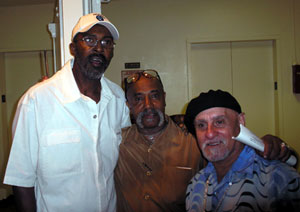The Attica prison uprising (libcom.org)

NEW YORK (FinalCall.com) – Survivors from the 1971 “Attica Prison Rebellion for Human Rights” gathered at the Martin Luther King Jr. Labor Center in New York City on Sept. 9 to remind the public and the media about the circumstances that caused the largest prison revolt in history; and the state sponsored murder of prisoners and guards alike.
“Today’s event is important, because we want to keep the Attica story alive,” stated Sadki Ojore Olugbala of the Safiya Bukhari Albert Nuh Washington Foundation, a co-sponsor of the event along with Local 1999 Employees Union. “We feel that the truth still isn’t known about what took place at Attica in 1971,” Mr. Olugbala told The Final Call.
On September 9, 1971, 1,300 men–in the Attica State Prison located in the western part of New York State–rebelled against their guards, holding at least 40 of them hostage. The prison held approximately 2,220 men, with 60 percent of them being Black and Latino. The guards were 100 percent White.
On Sept. 13, then Governor Nelson D. Rockefeller ordered the National Guard and the State Police to re-take the prison. When the smoke cleared, 39 men were shot dead (10 of them were guards) and some 150 more were wounded.
“The media has never really paid any attention to the real issues that caused us to stage the rebellion in the first place,” commented Melvin Muhammad, an Attica survivor. “They were treating us like animals. We were standing up for our human rights,” Mr. Muhammad explained to The Final Call.
Richard X Clark, a leader during the Attica rebellion, in his writings said: “I’ll tell you what caused the riot at Attica. Attica.”
The survivors who addressed those who attended the 36th remembrance of what many observers call the worst prison uprising in America’s history, all said that the media, and the state, have always mis-represented those five days in 1971.
“The truth won’t be revealed until the state is willing to take responsibility for what happened,” Che Nuevas, a survivor, told The Final Call. He said what he and others want to hear from New York state is accountability for Attica.
The media reported that as the prison was being stormed by law enforcement, the prisoners slit the throats of the guards. “That is not the truth; we protected those guards from harm,” argued Mr. Muhammad. “I took a bullet in the back. They don’t talk about that,” he added.
Gov. Rockefeller was forced by the court of public opinion to establish a commission to look into the reasons for the rebellion; and to find out what really happened in the yard after the governor ordered the troops in. The commission concluded that “the prisoner’s rebelled as a result of frustration and unfulfilled expectations.” It was also concluded that the guards’ wounds were the result of “friendly” fire, not because their throats had been slashed.
“We have always extended the hand of sympathy to the families of the hostages, but we were not responsible for their deaths,” Mr. Nuevas said.
Amy Goodman of the nationally syndicated radio show Democracy Now called the re-taking of Attica, “the bloodiest act of police brutality in U.S. history.”
Also remembered this year was Akil Al-Jundi, one of the main leaders during the rebellion and “a lead plaintiff in the class-action case against the state. When he was released, he came to the community and worked to bring about change, “a pledge we all made in that yard back in 1971,” Mr. Muhammad said. Mr. Al-Jundi died in 1997, and the lawsuit was settled for eight million dollars in 2000.
“Bro. Akil was one of the most beautiful Brothers you could find,” stated Mr. Muhammad. He was really down to earth, he added.
Mr. Nuevas remembers him as “a fiery Brother.” “He was always organizing. He inspired men to step up and do the right thing,” he said. He touched many people in many ways,” Mr. Nuevas said.
During the Q & A, after the survivors talked, they were asked what has changed from 1971 to 2007.
“Yes, I see a change. Now prison is big business. They lock up our youth to make money off of them,” Mr. Muhammad said. “We must convince them that going to jail is a bad thing,” he added.
Mr. Nuevas said that youth must understand that prison mirrors everyday life for far too many of us. “We may be able to get through to them by insisting that they learn the true story of the Attica rebellion,” he stressed.
“Attica is all of us!” stated Mr. Nuevas.












